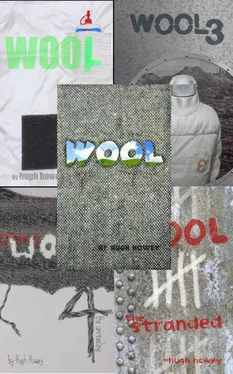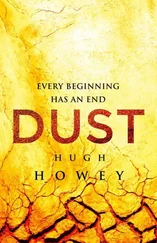“You feel okay leaving right after a cleaning?” she asked as they stepped out into the cafeteria. She knew how rowdy it would get later that night, and how testy the crowd. It seemed an awful time to drag him away on a mostly selfish errand.
“Are you kidding? I need this. I need to get away.” He glanced toward the wallscreen, which was obscured by the crowds. “I still can’t figure what Holston was thinking, can’t reckon why he never talked to me about all that was going on in that head of his. Maybe by the time we get back, I won’t feel him in the office anymore, ‘cause right now I can’t hardly breathe in there.”
Jahns thought about this as they fought through the crowd. Plastic cups sloshed with a mix of fruit juices, and she smelled the sting of tub-brewed alcohol in the air, but ignored it. People were wishing her well, asking her to be careful, promising to vote. News of their trip had leaked out faster than the spiked punch, despite hardly telling anyone. Most were under the impression that it was a goodwill trip. A reelection campaign. The younger silo residents, who only remembered Holston as sheriff, were already saluting Marnes and giving him that honorific title. Anyone with wrinkles in their eyes knew better. They nodded to the duo as they passed through the cafeteria and wished them a different sort of unspoken luck. Keep us going , their eyes said. Make it so my kids live as long as me. Don’t let it unravel, not just yet.
Jahns lived under the weight of this pressure, a burden brutal on more than knees. She kept quiet as they made their way to the central stairwell. A handful called for her to make a speech, but the lone voices did not gain traction. No chant formed, much to her relief. What would she say? That she didn’t know why it all held together? That she didn’t even understand her own knitting, how if you made knots, and if you did it right, things just worked out? Would she tell them it only took one snip for it all to unravel? One cut, and you could pull and pull and turn that garment into a pile. Did they really expect her to understand, when all she did was follow the rules, and somehow it kept working out, year after year after year?
Because she didn’t understand what held it together. And she didn’t understand their mood, this celebration. Were they drinking and shouting because they were safe? Because they’d been spared by fate, passed over for cleaning? Her people cheered while a good man, her friend, her partner in keeping them alive and well, lay dead on a hill next to his wife. If she gave a speech, if it weren’t full of the forbidden, it would be this: That no two better people had ever gone to cleaning of their own free wills, and what did that say about the lot of them who remained?
Now was not the time for speeches. Or for drinking. Or for being merry. Now was the hour of quiet contemplation, which was one of the reasons Jahns knew she needed to get away. Things had changed. Not just by the day, but by the long years. She knew better than most. Maybe old lady McNeil down in Supply knew, could see it coming. One had to live a long time to be sure, but now she was. And as time marched on, carrying her world faster and faster than her feet could catch up, Mayor Jahns knew that it would soon leave her completely behind. And her great fear, unspoken but daily felt, was that this world probably wouldn’t stagger very far along without her.
Jahns’ walking stick made a conspicuous ring as it impacted each metal step. It soon became a metronome for their descent, timing the music of the stairwell, which was crowded and vibrating with the energy of a recent cleaning. All the traffic save for the two of them seemed to be heading upward. They jostled against the flow, elbows brushing, cries of, “Hey, Mayor!” followed by nods to Marnes. And Jahns saw it on their faces: the temptation to call him sheriff tempered by their respect for the awful nature of his assumed promotion.
“How many floors you up for?” Marnes asked.
“Why, you tired already?” Jahns glanced over her shoulder to smirk at him, saw his bushy mustache twisted up in a smile of his own.
“Going down ain’t a problem for me. It’s the going back up I can’t stand.”
Their hands briefly collided on the twisted railing of the spiral staircase, Jahns’ hand trailing behind her, Marnes’ reaching ahead. She felt like telling him she wasn’t tired at all, but she did feel a sudden weariness, an exhaustion more mental than physical. She had a childish vision of more youthful times and pictured Marnes scooping her up and carrying her down the staircase in his arms. There would be a sweet release of strength and responsibility, a sinking in to another’s power, no need to feign her own. This was not a remembrance of the past—it was a future that had never happened. And Jahns felt guilty for even thinking it. She felt her husband beside her, his ghost perturbed by her thoughts—
“Mayor? How many you thinking?”
The two of them stopped and hugged the rail as a porter trudged up the stairs. Jahns recognized the boy, Conner, still in his teens but already with a strong back and steady stride. He had an array of bundles strapped together and balanced on his shoulders. The sneer on his face was not from exhaustion or pain, but annoyance. Who were all these people suddenly on his stairwell? These tourists? Jahns thought of something encouraging to say, some small verbal reward for these people who did a job her knees never could, but he was already gone on his strong young feet, carrying food and supplies up from the down deep, slowed only by the crush of traffic attempting to worm up through the silo for a peek of the clear and wide outside.
She and Marnes caught their breath for a moment between flights. Marnes handed her his canteen, and she took a polite sip before passing it back.
“I’d like to do half today,” she finally answered. “But I want to make a few stops on the way.”
Marnes took a swig of water and began twisting the cap back on. “House calls?”
“Something like that. I want to stop at the nursery on twenty.”
Marnes laughed. “Kissin’ babies? Mayor, ain’t nobody gonna vote you out. Not at your age.”
Jahns didn’t laugh. “Thanks,” she said, with a mask of false pain. “But no, not to kiss babies.” She turned her back and resumed walking; Marnes followed. “It’s not that I don’t trust your professional opinion about this Jules lady. You haven’t picked anything but a winner since I’ve been mayor—”
“Even—?” Marnes interrupted.
“Especially him, “Jahns said, knowing what he was thinking. “He was a good man, but he had a broken heart. That’ll take even the best of them down.”
Marnes grunted his agreement. “So what’re we checkin’ at the nursery? This Juliette weren’t born on the twentieth, not if I recall—”
“No, but her father works there now. I thought, since we were passing by, that we’d get a feel for the man, get some insight on his daughter.”
“A father for a character witness?” Marnes laughed. “Don’t reckon you’ll get much of an impartial, there.”
“I think you’ll be surprised,” Jahns said. “I had Alice do some digging while I was packing. She found something interesting.”
“Yeah?”
“This Juliette character still has every vacation chit she’s ever earned.”
“That ain’t rare for Mechanical,” Marnes said. “They do a lot of overtime.”
“Not only does she not get out, she doesn’t have visitors.”
“I still don’t see where you’re going.”
Jahns waited while a family passed. A young boy, six or seven probably, rode on his father’s shoulders, his head stooped to avoid the undersides of the stairs above. The mother brought up the rear, an overnight bag draped over her shoulder, a swaddled infant cradled in her arms. It was the perfect family, Jahns thought. Replacing what they took. Two for two. Just what the lottery aimed for and sometimes provided.
Читать дальше












